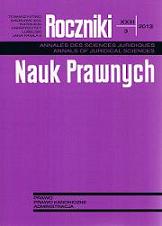Kogo sędzia może wezwać w procesie kanonicznym?
Who Can be Summoned in a Canonical Trial?
Author(s): Marta Greszata-TelusiewiczSubject(s): Law, Constitution, Jurisprudence
Published by: Towarzystwo Naukowe KUL & Katolicki Uniwersytet Lubelski Jana Pawła II
Keywords: citation; parties in a case; canonical trial
Summary/Abstract: Citation is an institution of procedural law that arises when a judge makes a decision to accept a complaint for a trial, expressed in the form of a decree that establishes parties to a process and binds them with formal-procedural relations with a judge and the object of contention. As a result, parties in a case are formally summoned to take part therein (citation sensu stricto), as are other participants, too (citatio sensu lato). This summons must be effected through a notification, i.e. an institution of procedural law which involves making the contents of a decree known to the parties and other participants of a case – here a citation decree. In terms of legal effectiveness, citation and notification are so tightly interwoven that a procedural distinction between them points merely to a particular sequence of activities in the theoretical structure of the process that must follow one another, since there is a formal-legal citation does not exist without its notification. The most obvious and essential subject of a notified citation is the parties – a petitioner and respondent – as well as another person who becomes involved in the case as a party. It seems quite obvious that an attorney ad litem can be appointed, and – given the circumstances – a legal guardian, court-appointed curator, or a special attorney. Moreover, a defender of the bond and a promoter of justice can be summoned to act as parties. Witnesses are also subject to citation.
Journal: Roczniki Nauk Prawnych
- Issue Year: 23/2013
- Issue No: 3
- Page Range: 117-130
- Page Count: 14
- Language: Polish

